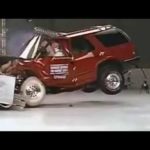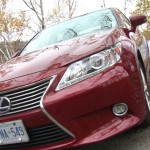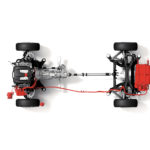Here’s a piece by yours truly from the Halifax Chronicle Herald, highlighting some of the slick and high-tech aspects of modern brake technology, and the things your car’s braking system is capable of doing, behind the scenes, and often, without you even knowing about it.

Most drivers are happy to squeeze the brake pedal, have their vehicle slow to a stop, and think little more about what’s happening in the background. If you seek a deeper understanding of cutting-edge braking-system technology, want to understand about torque vectoring, rain-brake support, or Electronic Brakeforce Distribution, and more, give this story on advanced braking technology a read.
You’ll have a deeper realization about what happens to get your ride safely stopped, you’ll know things about fancy brake system components, and you’ll be more interesting at parties.
Further, since a healthy and properly-functioning brake system is vital to the effectiveness of any high-tech braking system, here’s a look at 3 signs your ride’s brakes need a little lovin from your favorite mechanic:
 Squealing Brakes
Squealing Brakes
The all-important brake pad has the task of generating friction to stop your vehicle. When you hit the pedal, these pads clamp down on a rapidly spinning metal disc or ‘rotor’ that’s fixed to each wheel. This causes the vehicle to decelerate, but also causes the pads to wear as they’re exposed to tremendous heat and stress.
When these friction-generating pads are nearly worn out, a small metal tab attached to each one contacts the surface of that brake rotor to create an annoying, high-pitched squeal. That’s your cue to call the garage and book a brake job as soon as possible.
Ignoring the squeal is a bad idea. When brake pads wear out completely, dangerously low levels of stopping power and brake rotor damage can be expected.
Pulsating / Vibrating Brakes
Do you notice a pulsation when stopping with light to moderate pedal effort from highway speeds? This could be a sign that your brake rotors are warped. The pulsing or vibrating may be felt through the steering and brake pedal itself, and it can rattle the entire vehicle in extreme cases.
This is likely a sign that your once-straight brake rotors have become warped. Warped rotors happen because of poor-quality replacement parts, repeated hard, heavy braking and extreme heat. Warped brake rotors aren’t an enormous danger in themselves, though they may cause premature wear to other braking components.
Note that if the pulsation is continual and happens even when the brakes aren’t applied, it’s likely another problem. Have your vehicle’s tires and front-end and checked over if this is the case.
Weak Brake Pedal
When applying the brake pedal, deceleration should begin sharply, and fairly close to the top of the pedal’s travel. If the pedal needs to be pressed considerably farther before deceleration begins, or if you’re able to press to brake pedal to the floor, something is likely out of whack.
These symptoms could indicate a defective system component, or even a dangerous brake fluid leak. Your brakes could fail completely at any time, and your car needs to get to a mechanic right away.





